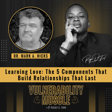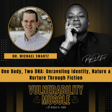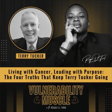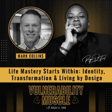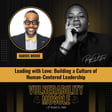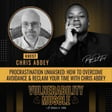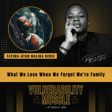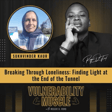Understanding Autism and Bipolar Diagnosis
00:00:00
Speaker
You're also autistic. I'm like, well, that explains a lot. It's like, that explains a lot. My life makes so much sense now in that perspective. You know, it's like, i now I get it. Right.
00:00:11
Speaker
And so was like one of the biggest, best things that ever fricking happened to me was like, now I understand. I understand the mechanism. i understand the driver. i understand why things never fricking worked.
Introduction to 'Vulnerability Muscle' Podcast
00:00:22
Speaker
Welcome to Vulnerability Muscle, the inspiring podcast challenging norms and helping you redefine vulnerability as a strength. I'm your host, Reggie D. Ford. Each episode of Vulnerability Muscle dives into a variety of topics such as mental health, social issues, and mindset shifts.
00:00:40
Speaker
We explore the power of vulnerability in fostering meaningful connections, healing, building resilience, and promoting personal growth. Sometimes these conversations are uncomfortable.
00:00:52
Speaker
but good workouts often are. So join us and flex that vulnerability muscle. Welcome to the vulnerability muscle.
Meet Ryan Christensen: Hypnotist and Author
00:01:00
Speaker
I'm your host, Reggie D. Ford.
00:01:02
Speaker
Vulnerability muscle, the inspiring podcast, helping you challenge your beliefs around vulnerability and looking at it as a strength that helps us connect, that helps us heal and helps us grow.
00:01:13
Speaker
Today, we have Ryan Christensen. Ryan is a hypnotist and author focusing on peak mental performance, emotional resilience, and life satisfaction. Ryan leverages his decades of experience in the military, counterterrorism, and counterproliferation were worlds to dive deep and rapidly lee identify the core beliefs holding his clients back.
00:01:37
Speaker
Ryan, thank you so much for being with me today.
Morning Routines and Medication Management
00:01:41
Speaker
all right you Thank you so much for having me on. It's an honor to be here. Yes. Yes. I appreciate you. I'm going to open it up with with a simple question, but how is your heart? What are you feeling today?
00:01:53
Speaker
man, my days are just like, I wake up at peace, have a general sense of wellbeing. You know, once the meds kick in, I've got ADHD and I got the bipolar disorder. So wake up morning. It's okay, I wake up, drop one power up.
00:02:06
Speaker
Now I got the day. Right. But once I'm, once I'm in my flow, you know, it's a, it's a beautiful space to be, you know, don't have to really worry about much. ain't got to do a whole lot to, to maintain that.
00:02:17
Speaker
do a bit of gratitude and abundance work in the morning kind of set my mind right and set the intention for the day. And it's time to rock and roll. Oh, I love that. And you just dropped a lot to explore and uncover there.
00:02:29
Speaker
Um, and, and you mentioned peace and you have a book winter piece, how to end inner conflict and make success inevitable. ah love that title. I cannot wait to explore all of that. But before we hop in, I want to do a segment called what comes to mind.
00:02:45
Speaker
And so you let me know the first thing that you think of. Okay. What comes to mind when you hear the word vulnerability? Ooh, vulnerability is voluntarily opening yourself up to harm in order to gain something even more valuable.
00:03:04
Speaker
Like I will allow you to hurt me because I need something more important. It's being willing to pay the price of pain to get something amazing. Wow.
00:03:14
Speaker
I love that. I've never heard that. And I, I, I, Ooh, I'm, I'm, I'm going to absorb that. Ooh. What do you do to center yourself when you're feeling stressed, overwhelmed, maybe even depressed?
00:03:26
Speaker
What do I do to what myself? To center yourself, to ground yourself. Yeah. Man, just take it to take a deep breath and take a step back. And all you got to do is ask yourself, what am I missing? If you're all wrapped up in that, if you're stressed, if you're frustrated, if you're banging your head against the wall, you're missing something. Because if you're right about the situation, about how you're approaching things, things will be working.
00:03:48
Speaker
So you got to be wrong. There's got to be something you're missing. Right. And that frustration and that stress in a lot of ways is your mind trying to force its way along the path you're on. Instead of stepping back and figuring out what path am I supposed to go go on. Right.
00:04:02
Speaker
If you're banging on your head on the wall and there's a door three feet to your left, that's dumb. Yeah. But if you take a step back and oh, there's a door, let me just go do that instead. You know, Just ask what you're wrong about, man. Ask what you're missing and your mind is going to help guide you to that answer so you can have a better solution and you can get back on your path.
00:04:19
Speaker
Love it. What is one of your favorite childhood memories?
Childhood Freedom vs. Modern Constraints
00:04:25
Speaker
Man. don't really remember a whole lot about my childhood these days.
00:04:30
Speaker
um What I found about memory is that it's kind of a tricky thing, you know, like your mind, your unconscious mind keeps a record of everything down there, but it only really gives you what you need.
00:04:42
Speaker
A lot of times these things are kind of coming back because it's important for you to learn a lesson or there's a problem i' still trying to solve or that kind of thing. But man, my my childhood was just pretty normal. I'll tell you what,
00:04:56
Speaker
lived on a, uh, on a cul-de-sac, know, one those streets that ended with the circles at the end of it. Right. And we moved in right when the whole like development was being built. So us and like four or five other families were there from the beginning.
00:05:07
Speaker
You know, was having kids the same time. So I grew up with like, I'm there 15, 20, 25 of us kids. I kind of like between over about a 10 year times fan. Right. That's fun. And so I had like this whole crew we'd run around with and then across the ditch, um, they're building up that next development, you know, but,
00:05:24
Speaker
six, seven, eight, 10 years old, right? there's all these construction sites with all these like big old dirt mounds and stuff like that. So we go over there all the time, like diving through the different construction sites and have like dirt clogged wars, chucking dirt clods at us from, know, mountain and mountain, you know, just being boys. And we,
00:05:40
Speaker
back then it was different know we'd take off you know 10 o'clock in the morning and we'd be gone until yeah started getting dark and you're like time to go home for dinner we're gone for all day you don't see that anymore which is a shame you you don't you don't we and i and i'm i think we're different ages i don't want to speculate or assume anything but but even when i was growing up it was we rode our bikes we played football and basketball and chase and and it was all day long and oh yeah no our bodies got sore and we we knew what it felt like to stink and come in one time a day to grab the drink and then go back out and be out for the rest of the day. And it's just different now.
00:06:18
Speaker
And it sucks. It's like a lost beauty that is that of of childhood outside of screens, outside of technology. And I hope we one day get back to that.
00:06:32
Speaker
Well, think about what it means in terms of like the agency you learn. Think about what it means in terms of just the freedom to explore and play and make mistakes. Yes. Yes. Make mistakes and like get hurt and then realize, oh, number one, I can make mistakes that and I can survive them and getting hurt not that bad. And I'd actually learn something and get to do it better the next time. And it's like, you don't get those lessons so much anymore. Everybody's so afraid. They're operating in space of like fear and like what can go wrong. It's like, okay, cool. But are you looking at what can go right?
00:07:00
Speaker
Yes, so true. So much goes right when you explore in ah in and control like in a controlled environment where you can take those risks to make mistakes and grow from those mistakes.
00:07:12
Speaker
And I think like it's just like, even like like we don't see as many casts kids' arms anymore. You don't see broken arms and broken legs. And like that was just like, you always had that to sign somebody's cast. Like, where is that now? It's wild. Yeah. Yeah.
00:07:26
Speaker
And the thing is, it's it's not about being in a controlled environment. It's being in an uncontrolled environment. Yeah, that happens. You outside, man. You never know what's there. You don't. I love that. You never do.
00:07:37
Speaker
So um can you tell me a little bit about your your military experience and and working counterterrorism? that I think that's super, super ah amazing work. So thank you for your service. But can you tell us a little bit about that?
Military Experiences and Mental Health Challenges
00:07:50
Speaker
Yeah. Yeah. So, you know, for as good as my childhood was, and it really was pretty good, like, you know, turns out of have autism, turns out I have bipolar disorder. Didn't figure that out until i was almost 48 years old. Right. So you can imagine like growing up in Kansas, 70s, 80s, autistic, like nobody has any idea what that goes wrong, but just stuff doesn't work. Right.
00:08:06
Speaker
ADHD, bipolar disorder, autism, IQ 145, Kansas, like one of these things does not fit. Wow. Wow. I am clearly the odd man out. Right. And so, you know, you kind of got to give yourself a reason to keep going when things are like that, when you can't get what you need. So for me, know, I grew up reading a lot of science fiction, a lot of military history, stuff like that.
00:08:23
Speaker
Heroic sacrifice is always a big, big thing. Right. And it's like, okay, well, everything's going to suck for me forever because things just don't work for me. Well, I can become Batman. my Batman's life sucks. It really does. But it's a good thing he's around because otherwise Gotham City Awards. So that's kind of what led me down that path.
00:08:40
Speaker
you know, joined the Marine Corps, know, as Russian linguist the Marine Corps, so I was translating, you know, all the stuff we were stealing from the Russians. know, when I moved over to the Air National Guard, I was working, uh, like predator, YouTube surveillance platforms, and then working support for like s sixteen and F 16, F 22 Raptors.
00:08:54
Speaker
And, uh, It was good. It was good, but I never really made a big impact there. I never really deployed, never went to the sandbox or anything like that, you know more like support stuff and didn't really feel like I had a big impact, but it got me into the contracting world in DC. So I started working counter his terrorism back in 2004 to about 2011.
00:09:16
Speaker
And then 2011 through 2018, I was working counter proliferation. And then after that, doing some tech stuff and some, you know, project management, that kind of thing. What counter proliferation?
00:09:29
Speaker
Counterproliferation is trying to stop people from getting weapons of mass destruction and i like the delivery system. So okay for me, when I was working the counterterrorism thing, I was going after like Hamas and Hezbollah on the finance side. And i was working against like Al Qaeda senior leadership in the Taliban and Afghanistan and Pakistan for several years. And then worked like the Iranian nuclear program and the ballistic missile program for quite a while, you know, and that was incredibly challenging, but incredibly rewarding work, you know?
00:09:57
Speaker
And I got to do some really cool things and have a really big impact, you know? Yeah. I got to go all over the world, talk to really interesting people, you know, man, I wish I could tell the stories. I really do. I really do. Stories. Right.
00:10:09
Speaker
Yeah. You know, it kind of wears on you for a while. It weighs on you for a while, especially, you know, the autism says I can't lie to myself, so I can't pretend, you know, the things I'm doing, things I'm seeing aren't real.
00:10:20
Speaker
I can't, I can't read that distance, you know, especially when you're in the counterterrorism world. I mean, you're dealing with the worst. You one I was offering really, well really big way. And even though I'm not right up in it, you know, I'm seeing it, experiencing it.
00:10:34
Speaker
Yeah. That takes its toll and you can't really talk to people about it. Yeah. and but I love what you said about how like autism, you can't lie to yourself. I think like that, that's, that's, I look at,
00:10:48
Speaker
autism and other forms of neurodivergence as superpowers you mentioned being batman right and and that is a superpower of autism and to be able to understand that about yourself and and know that it it there's some inauthenticity there when you can't be true to you can't be true to yourself and and so how what did that create in you what kind of conflict and what did that lead to Man, well, imagine.
00:11:15
Speaker
So I didn't even know that that's what it was. Because I didn't find that out for several years afterwards. Right. You know, I left the counterterrorism world in 2011. I didn't find out was autistic in 2000 until 2023. Wow. Right.
00:11:28
Speaker
So I'm carrying all this weight. I don't know what's going on. Right. and And I'm in and out of therapy for like a decade between 2009 and 2019. Like they don't know either. Wow. I'm kind of like doing the best I can, you know, but. it's walking around having this weight and like get home from everything. Your girlfriend, and your wife is like, so how was the day? i was fine.
00:11:48
Speaker
That's all can say. That's the extent that you can say, you know, that's fine. Right. Things are good. Right. ah And you know, if you can't process that on your own, if there's nobody to talk to you, I mean, that's just stuff just, just adds up. and That's why I had to leave the counterterrorism world just because it just became too much. It's too much. Right.
00:12:05
Speaker
How does that work when you're working with a therapist knowing that they have confidentiality? Can you disclose? Like, cause that's heavy stuff that you deal with. You still, my goodness. Wow.
00:12:16
Speaker
The reason why started therapy was, you know, I had a a major depressive episode in 2009. I just imploded, right? Cause it's just like so much stuff and just like broke, you know, felt like I had to be different people in different spaces. I could show this piece to this person, this piece to this person, this piece to this person.
00:12:32
Speaker
And to some degree that was just, you know, the job, but the rest of it was, that was autistic masking. Right. And I had no idea. My therapist didn't either. Right. So we didn't, know, spent several years, put myself back together and helped.
00:12:44
Speaker
Right. But didn't fix the problem. Didn't know what the problem really was. so Yeah. It's hard to address the root problem when, yeah, wow. Wow. Wow. And so, so where was, where was there, you said in 2023 is when you got diagnosed or you figured out the diagnosis, what was that realization like? And how did that shape how you, you viewed yourself or what revelations did you have?
00:13:07
Speaker
Oh man. So beginning of 2023, like I'm an entrepreneur, I've been working with myself for about but five years now. And, uh, if you got ADHD, be an entrepreneur's heart because there's a bunch of stuff that you have to do that you really don't want to do that you're not good at know And with the ADHD, like, you know, especially with autism, my mind's like, no, I don't want to, and I'm not going to, you can't make it. Right.
00:13:29
Speaker
And so it's like, all right, time to get treatment for this. You know, I'd always kind of known that. So March, April timeframe, I start getting treatment for that, start getting on medications and stuff like that really starts helping. Problem is, You know if you've got things like Adderall and Walbutrin and stuff like that, you know, Britalin and what have you, if you give that to somebody who has bipolar disorder, it can trigger a manic episode.
00:13:48
Speaker
I didn't know it bipolar. It triggers a manic episode. Wow. Right. And there's something called autistic thought looping where your your mind grabs onto something, just will not let it go. So all of a sudden I figure I'm right about it a lot of stuff I'm doing.
00:14:02
Speaker
I'm in this manic phase. My mind just keeps on cranking and cranking. It's like the hype train keeps going, zero breaks off the cliff like of. So ended up having a psychotic break and I'm getting arrested, thrown in jail, charged with three misdemeanors, felony assault on a police officer. you know, my mind just flat out broke.
00:14:16
Speaker
Right. So I'm like, okay, time to go in and get a full psych evaluation. Cause that was a surprise. want to make sure there's yeah other lame eyes in there that might blow up. And it says, okay, yeah, you got the ADHD, you got the bipolar, you're also
Breakthrough in Mental Health Understanding
00:14:26
Speaker
autistic. I'm like,
00:14:27
Speaker
well, that explains a lot. That explains a lot. My life makes so much sense now in that perspective. you like i Now I get it, right? And so it's like one of the biggest best things that ever freaking happened to me was like, now I understand.
00:14:41
Speaker
I understand the mechanism. I understand the driver. I understand why things never freaking worked. Because this seems wired different, you know? And fundamentally, one of the things about like Asperger's or autism, it's kind of like my camera's busted.
00:14:56
Speaker
yeah I was talking with Guy and talking about kind of what I was He says, oh yeah, like I'm, oh, I know exactly talking about. He says, I'm colorblind. Like, what do you mean? It's like, well, because he can't see those gradations between colors because he can't really perceive a lot of colors, he can't see a lot of the details that you all get wrapped up in.
00:15:13
Speaker
But because he sees the patterns and the shapes so much more clearly. Right? That's good. So being socially colorblind, there's a lot of stuff about humans, interaction, social stuff that I literally cannot perceive. Wow.
00:15:26
Speaker
So you guys are making movement through the world based on all these details that I'm blind to. But because I can't see that detail, I can't get wrapped up to it. So I see all the patterns just like clear as day.
00:15:38
Speaker
Right. Superpower. I work on the patterns. Yeah. I see you're working the patterns, right? Because if there's a pattern exists, well, there's something that drives it. Right. Cause and fact. Trying to figure out you, trying to figure out a group. Now I can figure out what the rules are because i can figure out how you work, now i know how you're going to respond to stuff. Now I know how to interact.
00:15:53
Speaker
So I've been reverse engineering people and situations and environments my entire life. Then I weaponized it with 23 years in the Intel community because that's all about figuring out how stuff works when half this is the pieces puzzle are missing.
00:16:04
Speaker
So this is like weaponized autism. Like, good luck. Good luck. I'm going to figure that stuff out. Right? Oh my goodness. I have never heard it described in that way, but it paints such a beautiful picture of how your brain works.
00:16:18
Speaker
I'm curious how you would, how you would paint a similar picture or how you would describe living with bipolar disorder for folks who may not know what that truly means. Sure. So let's say everybody's got like an emotional range.
00:16:33
Speaker
right Kind of like ah a left and right limit. You can only get really so sad. don't really get too happy. Right? So yours goes to like one to seven. Mine goes from like one to 15. Right? So everything is like five, 10 times as a tense in both directions.
00:16:47
Speaker
Right? So I got depths of hell, heights of heaven, everything in between. Right? And because it's a bipolar disorder, you have a lot less control over what those reactions are and they're much, much, much more intense.
00:17:03
Speaker
Right. So when I get, when I get sad, I get down, I get deep. When I got depression, like it's deep in the hole. Right. But on the flip side, you know, when I'm having amazing time and I am on top of the fricking world, you know, when I was going through that manic episode, I straight up felt like a God, like it was that big. Right.
00:17:19
Speaker
Right. But there's some big problems with that because when you're feeling that deep in the hole, everything you do is wrong. And it's really easy to but to slip into that, you know, desire to get out of this, to end it, to slip out of that world. Right.
00:17:32
Speaker
and Since I've been dealing with that my entire life, the first time I went out, the first time I had decided to kill myself, was nine years old. Right. Wow. Cause just stopped and definitely never worked and it was never gonna change. i was like, screw it. I'm out.
00:17:44
Speaker
Yeah. You know? And so that's been a feature my entire life. It's not an issue anymore. Cause I've done some interesting things with emotions to really kind of change how my mind processes and play with it and be on the medication, stabilize it. So it's not as volatile and kind of put some left and right limits, kind of put some guardrails up so i don't go off the cliff again.
00:18:02
Speaker
Yeah. So it's a a lot easier to manage, but it also means that you become really comfortable. being on both ends that spectrum, you know? Yeah. I can be just high as a kite and just massively um makete feeling amazing and knowing like this is beautiful and it's going to end and that's okay.
00:18:21
Speaker
And I can be in the depths of hell going, it's okay. Right.
Impact of Undiagnosed Conditions on Life
00:18:25
Speaker
It's okay to be here. I've been here before. I know how to manage it. It's just fine. You know, so it gives you a certain equanimity when you're kind of dealing with that. But yeah,
00:18:33
Speaker
Man, hard to control those impulses. I can't ah cannot count the number of stupid things I've done throughout my life because it's just like, this is what that is. you know you know and We got bipolar, it's it's hard to navigate the world. It's hard to hold down jobs. It's hard to make relationships work.
00:18:50
Speaker
yeah Think about being autistic and bipolar, not knowing it. you know Pretty much any relationship I was in up until last year was just like doomed to failure. That's so tough. Yeah. Well, they think about like, I've got serious undiagnosed, untreated mental disorders.
00:19:04
Speaker
I have no idea. My partner has no idea. How the heck are we supposed to navigate that? Yeah. Yeah. Yeah. And, and like you said, like it is, it affected, I'm sure school at a period of time and affected how you showed up as a child and what parents and adults perceived of you. It it affected friends and, and words in so many aspects of your life. Everything.
00:19:25
Speaker
Oh, man. But you were able for for a good period of time and hone in and focus in on the work that you were doing. But what do you think that could have been, like like speaking to employers or corporations, like what could have helped you in that?
00:19:42
Speaker
and that Had you known and then were able to communicate that, what were some of the things that could have helped you during that time?
00:19:51
Speaker
I think one of the biggest things is, know, as in the intelligence world, like there was a lot of like work with other offices, working with other people, working with other services, people that, you know, around the world. And if I'm the guy that's trying to make those connections and have those conversations, right.
00:20:08
Speaker
that's difficult because I don't understand people the same way. You know, I don't understand the rules the same way and I'm a lot more volatile. So I am not the right guy to put in front of really difficult people.
00:20:19
Speaker
Office politics is not my thing at all. Horrible. That stuff, horrible. That stuff. And so, yeah, like I remember, know, I got fired a couple of times from a couple of offices because like I just,
00:20:31
Speaker
could not manage to keep things in check and be diplomatic and like play that game, you know? And so, know, I remember one, one job i was at, I was basically liaison with another office and they were just infinite. they they They had a reputation for being really hard to work with.
00:20:48
Speaker
And I'm the guy that's running that relationship. I don't deal with things like frustration. Well, right. So there were a number of times where you just had flat flat out shouting matches about stuff.
00:20:59
Speaker
Right. And sometimes you got to go a little Hulk smash diplomacy on somebody because we're just being too stubborn and stupid and just not, you got to smack them upside, let, let, let in, but that should not be your standard approach.
00:21:10
Speaker
Yeah. It's not the go-to. Yeah. Like we don't do that first. Yeah, know. That's, that's probably not the right way to go about things of right, right, know, right ahead. But like, you know, especially I was going through my second divorce that time, you know, bipolar, like autistic, like, man, that was just doomed to happen.
00:21:24
Speaker
And I was the wrong guy to be put in that situation. But They didn't know. I didn't know I did the best I could. you know, I just said, we got to get rid of you because you're messing stuff up. I'm like, well I get it. You know, fair enough.
00:21:35
Speaker
But probably wouldn't got fired as much. There probably a lot of things that would have gone smoother if we had, you know, had somebody to handle that piece of the puzzle for me, you know, so I can focus on the ways that I can, that can do those things best. You know, it's like, this is my zone of genius.
00:21:52
Speaker
Let me play here. you handle the rest the stuff, you know? Yeah. Yeah. I like that. I like that.
From Intelligence to Hypnotism
00:21:57
Speaker
Uh, and, and you became hypnotist became hip. What, what does that, what does that look like in your world?
00:22:07
Speaker
And, and how do you use that in your mental performance coaching? Sure. So, you know, 2019, 2020, you know, it's realizing, you know, the world does not want to be saved. So clearly I'm in the wrong line of business. Right.
00:22:20
Speaker
And, what do you mean by that? Elaborate on that. So a lot of them the work you do in the intelligence space is to buy space, you know, create space and buy time for somebody else to fix the fricking problem.
00:22:32
Speaker
Right. Like you're in Afghanistan, you're trying to create peace. Right. And everybody's trying to blow everybody up. So you're trying to like tamp that down. So it's like to diplomats. Everybody else can like negotiate the peace and make things more stable.
00:22:45
Speaker
Right. And so what I was recognizing it throughout the 20 teens, especially like nobody was actually doing that second piece of it. Create this ability, create the peace, you make things better.
00:22:57
Speaker
I'm like, why am I spending all this time, energy and effort and taking on all this weight and doing all this work when you're wasting the space that I'm creating for y'all?
00:23:07
Speaker
Hmm. Right. And you guys don't really want peace. You don't want things to cooperative. You just want to own stuff and whatever on the show. It's like, I can't do that more. Like, it's just this is the wrong line of business for me.
00:23:20
Speaker
Right. So I started looking around, like my dad runs a nonprofit. My mom, you know, helps people with mortgages. My brother's a financial advisor. Right. And they're always talking about how they're helping this person, this person, and how much satisfaction they get. I'm like, okay, cool. Like maybe that's direction I need to go.
00:23:32
Speaker
can So, you know, at the same time, I'm doing a lot of work on myself, really started that personal self-improvement journey. And I'm sitting there thinking about becoming a psychologist, right? But that's going to take six years and half a million to get my PhD. I'm in my mid forties. So that's really unappealing because it means I got to deal with this stuff for another four or five years before I can even start doing my, I wouldn't even make, I wouldn't even be certified and running my own practice yet.
00:23:55
Speaker
Yeah. Right. Yeah. It's a long journey. Yeah. But one of these groups I was in, one of the guys was ahead and just talking about like toxic shame and emotional baggage. i'm like, know, I've got some of that race Catholic. So did a session with them and just felt lighter.
00:24:06
Speaker
You carrying around 50 pounds of junk, get rid of 20 pounds. Everything's easier. Right. I say, well, all right, well, let me go ahead and dip my toes in this. Right. Cause I get, I get certified as a hypnotist for about two grand and six weeks of training, much lower investment and get to start playing around and see if this is something I do.
00:24:21
Speaker
So I got certified in February of 2020 and twenty about two weeks later, everything shuts down. Yeah. Right? And here's the problem. Everything I do is classified, so I can't work from home. Oh, man. Right? So I got nothing but time.
00:24:34
Speaker
Yeah. In these various groups. I'm like, hey, want play? You know, got some new talent. So started working with folks, seeing some changes. I'm like, all right. Got some talent with this. Got some more training. Started my business in April 2020. Went full time in October 2020. Been doing it ever since.
00:24:48
Speaker
As far as mental performance and everything goes, fundamentally, the most difficult thing is when you're not on your own side. Right. If you got that internal friction, then you, your button heads with your subconscious mind, things are all friction. Right.
00:25:02
Speaker
And if you think about a company where all the departments are fighting with judge, like you can't get nearly anything done. Right. Everything is infinitely harder. Right. So for me, hypnosis is about if consciousness is the the CEO of a company, you got your rational mind. That's more like the senior management, got your emotional mind. That's kind of your mental management, got your instinctive mind. That's kind of the worker bees. Right.
00:25:21
Speaker
And so it's about getting down there and figuring out, all right, what are these people doing and why, right? What is the source of these conflicts? Right. Cause if I can figure that out and I can resolve those conflicts, these people can work together as a team.
00:25:35
Speaker
Now, every bit of me is on the same page, moving the same direction, same purpose. Everybody's working right. That's just, you are now fully unlocked, but it means getting down there and figuring out what the heck is going on.
The Role of Hypnosis in Personal Growth
00:25:49
Speaker
Yeah. Got a lot of really good tools to work on the conscious and the ration levels. Right. Right. All kinds of coaching. All day long. Don't really have a lot to play with the emotional instinctive minds. Right.
00:26:00
Speaker
The only real way to get down there is like psychedelics and hypnosis. Psychedelics are beautiful, give you a lot of awareness, but they're going to take you on whatever ride they want to take you on. Yeah. Show you whatever they choose. Yeah.
00:26:12
Speaker
That's what you can do, change while you're down there. And when you're back, that door is closed again. So everything you do is what? Conscious integration. Now that I know this stuff, have this more room, what am i going to do with it? But hypnosis lets me open that door.
00:26:23
Speaker
Wow. Keep that sucker open as long as I want to. I get to go down there for whatever I choose, target exactly what I want to. And I can stay down there until it's actually fixed before I come back.
00:26:35
Speaker
So in some ways it's kind of like a targeting and fixing thing where the psychedelics and everything else give you a lot of idea the the land, what's going on down there. And now with this knowledge and understanding, I can go down after what I really want to do and fix it directly.
00:26:47
Speaker
Wow. Right. Wow. A lot of times stuff is, yeah. When lot of times with stuff is just kind of like not working and just like not really you know, there's something wrong, but i have no idea what it is. play with some psychedelics, you do some of these other techniques like the somatic stuff and the breath work and the, you know, the, the emotional body stuff kind of like put, just push some, poke some fricking buttons and see what comes out.
00:27:06
Speaker
Yeah. Yeah. It's a provocation. Just like poke the fricking bear and see what happens because that's going to give you something, right? You know, and then you can start getting that old. That is good. That's been a, it's been a part of my journey of, of, of trying. Let's try it. Like we, yeah we did it one way for a really long time and I don't think that was the way to go. And so let's try all these different modalities, all these different ways of of integrating and and feeling the body and feeling the emotions. And so I love that.
00:27:34
Speaker
When I think of hypnosis, right, um I got a clock or a watch, swinging back and forth. Is that what it looks like for you? and And then you put a person in a trance and and you snap your fingers and they're doing whatever you say.
00:27:48
Speaker
What does it look like? well Think about it this way. So one of the principles we have in hypnosis is this idea of the critical factors, it's kind of like the barrier between the conscious and the unconscious mind. Right. And what that says is your unconscious mind is judging true and false based on what our already believes. Okay.
00:28:03
Speaker
Which is why it's so hard to do a lot of change because if I believe that I'm not good enough, then all the success doesn't matter. It's ignoring it. Right. Doesn't match this false by definition gets ignored. So you supposed to change everything if it's ignoring all evidence that's wrong?
00:28:16
Speaker
Right. So hypnosis really is a very simple thing. It's as a set of tools that give me more access to your unconscious mind. lets me drop that critical factor, drop that wall. How you do that, there's a number of different ways. You can do the pocket watch if you want to, the spinny little wheel if you want to, flashing lights.
00:28:31
Speaker
For me, it's just kind of like a guided meditation. Take you through a process, lead you down there. Great. Now we have access. The whole snap your fingers make you do the thing. Well, you know, if you do look at like stage hypnosis, right? Got all shows, people do all this ridiculous stuff.
00:28:44
Speaker
what the hypnotist is doing is he's talking to the audience ahead of time, you know, as that sort of like preamble and everything else kind joking and so forth and so on. like And he's watching to see who's responding and who's really paying attention. Who's really interested.
00:28:56
Speaker
And those are the people who's picking to come up on stage. Why? Because it looks like they might want to play the game. Right? He runs through some hypnosis exercises. Oh, you're responding. You're responding. You're not really working. Get out of here. You don't really want to play. So the people he has up, he's got five people that want to play the game.
00:29:10
Speaker
Wow. That want to things. That want to act stupid up on stage to to entertain people. Perfect. So I've found people what? I've found people are willing to be led through a process, willing to be led through experience. Right? Right.
00:29:23
Speaker
The suggestion stuff is like, all right, i'm going to go ahead and drop in all these really cool things for you, right? You're awesome. You can do the thing. You're safe, whatever. So I'm trying to create a new belief system and some new systems for you, some new frameworks to change stuff, right?
00:29:37
Speaker
Beautiful. And it's also, hypnosis is phenomenal for changing the way the brain processes information and sensation, right? Smoking sensation, getting people stop smoking. Hypnosis can get you to stop smoking in one session.
00:29:52
Speaker
One session. wow There's actually a section on the American Lung Association. They have a list of hypnotists to work with to make, get you a stop in a hurry. Wow. So if we get in there and we're talking and like, I make the idea of smoking cigarettes, be something disgusting to you and I make them so taste disgusting, make you feel bad when you smoke one.
00:30:08
Speaker
It ain't going to take you long to stop doing that because it's a disgusting aversive experience, right? Cause I've changed the way your mind is processing that experience. Wow. Pain control. Phenomenal for pain control. Yeah. Right.
00:30:20
Speaker
Lady who taught me hypnosis gets migraines. If you know anything about migraines, it just sucks. There's nothing you do with. But when she gets a migraine, she just goes the back your head, turns down the pain from nine to three and goes about her day.
00:30:32
Speaker
Right. Kate Middles. Wow. You know, wife of Prince William of England, right. All three of her kids, she used hypnosis for pain control during childbirth. She got access to the most best medical care in the world and used hypnosis control the pain instead called hypnobirthing.
00:30:46
Speaker
Right. And all that is what? Getting your mind to process things in a different way. But just like psychedelics, if you're not actually figuring out what things are, you can't really fix it. All that is generative, creating new possibilities, and new ways of looking at things.
00:31:00
Speaker
Wow. Wow. my sleep Wow. When you're looking at it from suggestion standpoint, if that critical factor says no automatically, really what you're doing is just removing that automatic notice. There's space to have a negotiation. It doesn't say yes automatically.
00:31:12
Speaker
It just doesn't say no right off the bat. There's space. Yeah, that and that that makes me think of of kind of, you know, a message that you emphasize of of transforming emotions from being perceived as pain to being seen as questions.
Reframing Emotional Pain into Questions
00:31:26
Speaker
Yes. like Questions and that negotiation. Can you elaborate on that and how it can help shift somebody's mind and perspective?
00:31:35
Speaker
I've actually become, you know, started to talk about or think about this idea of emotional pain is kind of like the original sin of self-improvement work. Like the original sin of all this stuff, because when you have this idea that emotions are pain and they come from emotional wounds and they're caused by emotional trauma, that sets up a mental framework and there's like conclusions you get to. You take this to logic logical conclusions, some really interesting things come out. Okay.
00:31:58
Speaker
If emotions are pain,
00:32:02
Speaker
Now your mind has to treat your emotional state as a threat to your physical survival. Right? Which kicks off a couple of different things. Number one, you got to avoid all this stuff, right? Pain is three times more powerful than pleasure.
00:32:16
Speaker
Three times more powerful as a negative reinforcer. Really hard to engage with stuff when you're dealing with that. Right? And it does become a threat to your physical survival. Why? Because if you're in too much pain, you can't escape it. What do you want to do? Get the hell out of here.
00:32:27
Speaker
Right. Right. So it becomes a threat to your physical survival because it freaking is. Over 300,000 people died in the U.S. in 2023 from alcohol, ah drug abuse, and suicide.
00:32:38
Speaker
Deaths of despair. Deaths of despair. Their emotions killed them. Trying to numb it, trying to numb that pain, i trying to avoid something. or just escape Yeah. Yeah. So the other pieces, if they come from wounds, that means that every single negative experience in your life is another wound to you.
00:32:51
Speaker
Got to play whack-a-mole every single one you got to deal with. Right. So fine. You deal with all your insurance stuff. Great. you got to deal with 10 years. Now you got to deal with it. Now you're catching up your twenties, but you're 40 years old now. So you got another 20 years stuff. Right. which is why that process never ends because every single experience has another thing you've got to deal with and heal.
00:33:06
Speaker
hey And if it's caused by emotional trauma, guess what? Other people make you feel right. So you don't even have control of what happens in your head.
00:33:17
Speaker
You're always a victim because people can make you feel people can stick stuff in your head and drive that in your experience. Right. So all kinds of problems with that. Now, I'm not saying that's a really bad model, right? All models are wrong. Some models are useful.
00:33:30
Speaker
When you're trying to work with somebody who's in that space, using that model means you can meet them where they're at. Right. And there's all kinds of things you can do with that to create space, turn down the dial, all that stuff. So I'm not saying that that's a bad model to use. Like it's, it's useful.
00:33:44
Speaker
right That's the truth you're running on. Play with it. But you when you turn emotions from pain into questions, something interesting happens. Number one, every negative emotion you experience is just your mind saying, I see this world in a certain way.
00:33:56
Speaker
I'm facing a certain cat challenge and I need your help to help me solve it. So it's your mind asking you for help to figure stuff out. So that's something to you. It ain't trying to hurt you. And it's like, no, I need your help.
00:34:09
Speaker
It's speaking, it's signal. It's the sex speaking you as it always is, right? Yeah. Number two, since it's not pain, you can you can engage with it. it's not doesn't It doesn't have that push away, right?
00:34:20
Speaker
And if you think about it, like if your hand here is just supposed to look at your hand because that's where the problem is. So these pains are actually trying to help you show you what the heck the problem is it's trying to solve. Always. Even when you're seeing this pain, all the pain, pain points away.
00:34:32
Speaker
But if it's just, hey, you but your hands busted, okay, great. I can do that without having to make it painful, right? Which also means it doesn't trigger the survival parts of your mind anymore.
00:34:44
Speaker
You're no longer a threat to yourself. You're no longer a threat your own life. Wow. Right? You don't need to escape the world because you don't need to escape the pain because there ain't no pain. It's not possible for you to suffer mentally and emotionally anymore if emotions aren't pain.
00:34:58
Speaker
Right? You can stay in that negative emotion as long as you need to to figure out what the problem is and get moving again. That's the other piece. so All these negative emotions, all these negative experiences are your mind saying, I need to solve this challenge to get you what you want.
00:35:12
Speaker
Every negative emotion, it's how I'm helping you figure out what the problem is so you can get to where you want it so feeling bad becomes a good thing. Yeah. And then it like, to your point of, of reframing things around the question, it makes, it's not even truly a negative emotion. We just perceive it as a negative emotion. It's just an emotion. It's neutral. It's there. It's talking to you. It's saying, Hey, I want you to pay attention to what's going on right now.
00:35:35
Speaker
This is the situation we're facing. This is the kind of thing we're coming up against. No more or less. Right. You're afraid of something. Why? Because there's a threat of some kind out there you need to get back away from.
00:35:46
Speaker
That's a good thing telling you that. Yeah. to Yeah. That's a friend. Very good thing. That is a frame friend. Friend. Right. Yeah. You're sad. Why? Because you lost something incredibly valuable. Awesome. What'd you lose? Why? What was it about that? That's actually important. I need to do.
00:36:00
Speaker
Oh, what are all the good things I took from that experience? Right. That's a good thing. Yeah. It's a good thing. But the other piece is this, if it's not pain anymore, they're just questions and it's not coming from a wound, right?
00:36:12
Speaker
Which means there ain't anything for you to heal. It never was.
00:36:17
Speaker
And they're not caused by trauma, which means nobody does this stuff for you. It's just your interpretation the world your interpretation in such a situation, right? Which means you're now sovereign over what's going on in your head. Hmm. Yeah. And it also means get some of that your traumatic experience is just you running up against a challenge you didn't know how to conquer didn't find a way to win.
00:36:37
Speaker
Your mind is screaming at you for help. You didn't have an answer. so No more or less. That's it. I love that. I love that so much. What are some some practical steps that individuals can take to start to reframe, you know, those processes in their mind on ah on a
Practical Steps for Emotional Reframing
00:36:53
Speaker
daily basis? is Are there their writings? Are there, you know,
00:36:57
Speaker
reminders or anything that they can do? Well, think about things this way. Number one, one of the biggest problems we have or one of the biggest challenges faces, we think that there's one answer.
00:37:09
Speaker
We think there's only one thing that's true at a time and that's not actually the case. Okay. Your unconscious mind, emotional part of your mind is looking at patterns over time. It's looking at narratives to run through things. It's looking at the forest.
00:37:20
Speaker
The rash of mine is looking at the trees, individual events, individual problems, in individual details. I know that I'm good enough, but I don't feel like I'm good enough. Why? Because you're looking at the problem from different perspectives, which means they're both 100% true and correct at all times.
00:37:36
Speaker
Wow. Right. So both are true, even when they're freaking conflicting. Right. So number one, give it its due. It's right. From that perspective, Obi-Wan Kenobi, what I said was true from a certain point of view.
00:37:50
Speaker
yeah right Okay, fine. Assume that it's right. this Okay, you feel you're saying that I'm not good enough. Great. What has to be true for this to be the correct answer? When I back up and look at things from that bigger perspective, what has to be true for this to be the answer?
00:38:04
Speaker
because then you can actually start doing stuff about it, right? If you allow, that's the other thing, allow things to be true long enough to do something about If you felt like you're not good enough in life, trying to be good enough, it's really easy to say, that's wrong, i don't want to deal with it because I've been working it so long to make this the answer.
00:38:22
Speaker
But still saying that is. So let it be true. Just let it be true long enough to play with it, right? Because it doesn't matter whether it's true or not, running out as if it's true, acting as if it's true, so it's true for that part of you.
00:38:34
Speaker
Right. So let it be true. Let it be true long enough to do something about it. Right. Because if you want to go from point A to point B, you got to start at point A. Yeah. guidance You got to own what point a actually is.
00:38:46
Speaker
Anything else you live in a lie. I love this. I love this so much. This reminds me of of, you know, part of vulnerability muscle is it's about being vulnerable with yourself.
00:39:00
Speaker
and And having the ability to to look at your story, look at your role your story, look at the pain that has been caused, the pain that you have caused, and all of those different things that we often neglect.
00:39:14
Speaker
And how empowering it is, to your point, like once you sit with it, when you're able to to explore it a little bit, then what can you... alchemize it into what can it turn into what can you learn from it it is it is a beautiful journey but you have to be real with yourself you have to be vulnerable in that process to get to that that destination so i absolutely love this approach and yeah um yeah i think i think it's just like i'm i'm just sitting here i can listen to you talk all day long and just like yeah it's it's so fascinating
00:39:52
Speaker
It's really fascinating.
Writing 'Winter Peace': Ending Inner Conflict
00:39:53
Speaker
I'm curious about your book, Winter Peace, How to End Inner Conflict and Make Success Inevitable. What inspired you to write that and and what can we gain from that?
00:40:06
Speaker
yeah well So 2019 to 2023, I'm doing all this work on myself, trying to fix myself. Right. And did pretty much everything under the sun, all these different techniques and tools and modalities. I did all of them. Right. And all of them make things better. I'll move the, you know, move the thing forward, moves a needle, opens up space. Right. Everything helps.
00:40:24
Speaker
But because the autism and the fact that I can't lie to myself, I cannot pretend that better equals fixed. Right. That better equals done. Right. And the thing is all of it, like I said, all of them work all, but the thing is that all models are wrong and some models are useful.
00:40:40
Speaker
Right. So each tool works in a different way. So it's a different kind of problem. So what I is like, all right, I'm not there yet. was supposed to he get this result doing this thing and I didn't. Fair enough. So it doesn't work the way they say it does.
00:40:52
Speaker
So how does it work? What are the underlying essential what are the under principles? What are the left or right limits? Right. Cause then you can figure out the right tool for the job and it becomes a sequence. Right. Well, pretty much everything kind of gets you that 20 yard line and then you're stuck.
00:41:04
Speaker
Because most of the problems are in that emotional instinctive layer in the unconscious mind, not a lot tools get down there. So we gotta use hypnosis. Fair enough. And part of the difficulty, the reason why keep on trying to fix all this stuff is because this idea of I'm not good enough keeps on playing because we don't address it on that level.
00:41:20
Speaker
But this came about for a reason. There was a pattern that was created. There's a pattern that was spotted that drew certain conclusions from ideas about who we are, ideas about how the world works. It's who I am, how the world works determines how need to move through it.
00:41:32
Speaker
Fair enough. All those answers are in the back of your head. Your mind knows exactly what it's doing, exactly why, why it's necessary, was trying to accomplish, where it came from. So why the heck am I guessing? I'm Intel guy.
00:41:43
Speaker
You've got the answer. Frickin' show me. Frickin' show me, right? And so that's what took me like down this road of like, oh, it doesn't work like this. It works like this. This implies this. We go over here with this. Awesome. I just started deconstructing and reverse engineering the whole thing, just like I do every other thing in the world, just to navigate it and until I figured out the truth. Because.
00:42:02
Speaker
Once you figure things out, they're so simple, right? Oh, emotions are pain. Threats or survival means our life has to manage our own life to you know keep us from having too much emotional keep us hitting buttons. Great.
00:42:13
Speaker
If we feel like we're not good enough, we have to create another us, create another identity to fix it, right? I'm not good enough. Got to figure out what to fix. Oh, no, it's just I'm not good enough. Not i'm good enough because no no, we're keep on trying to figure out what the thing is we need to fix.
00:42:27
Speaker
Just keep showing up. Oh, means this stuff isn't actually the problem. This is fix this go from a not good enough to, I am good enough. Don't have to do anything. So winter peace in a lot of ways is an attempt to lay out what I figured out, what I understood, different view of the mind, different view, of way way of viewing these things and walk you through that process.
00:42:50
Speaker
of going from I'm not good enough to I am good enough. I got to fix myself. So I don't have to fix myself. Good enough as I am, deserve whatever I choose. Don't have to prove it. Don't have to be anything different because here's the thing about vulnerability.
00:43:05
Speaker
A lot of the reason you're being vulnerable is because you want to, you're showing people the things about yourself you don't like. right But if emotions aren't pain, they can't hurt you.
00:43:17
Speaker
So there's no risk. And if you get to the point where you're good enough as you are, don't have to fix it. It means there's not parts of yourself you don't like. So you're not being vulnerable. You're being authentic. You're you are because it's okay that you're less than perfect.
From Vulnerability to Authenticity
00:43:32
Speaker
I love that. I love that. Because them seeing that doesn't push a button anymore because there ain't no button to push.
00:43:40
Speaker
Yes. It puts you back into the driver's seat. i what What you just described in Winter Circle or or Winter Peace. winter circle it is We're in the Winter Circle, but the Winter Peace is it it reminds me of the TEDx that I gave last year and it was how self-love heals, what self-improvement harms.
00:43:58
Speaker
And was around the same concepts that you spoke about when when you shift, and and not to the degree of actually how to shift the the mind around it, but the motivation around why am I doing what I'm doing? Why do i have this chip on my shoulder versus feeling like I deserve it because I love myself. um I'm supposed to have abundance. I'm supposed to be satisfied and happy and fulfilled.
00:44:23
Speaker
And i think it's a it's a good i like pairing those two. I think that's a good resource. And I'm going to recommend that to a lot of people. i think that's really awesome. Thank you. Yeah. I'm curious.
00:44:35
Speaker
You you mentioned earlier that memory you talked about memory and how it's a it's a it's a weird thing, a funny thing at times.
Uncovering Memories through Hypnosis
00:44:43
Speaker
Has hypnosis helped you?
00:44:47
Speaker
uncover memories that probably were unable to recover without it. And me personally, not really. Um, but I've had that happen with a number of my clients and think about it this way, you know, we're getting down there. We're saying, all right, you're trying to solve a problem by doing this thing. Like not letting yourself succeed in life. Fair enough. Trying to solve a problem. Great. Show me the problem you're trying to solve by doing that.
00:45:11
Speaker
And your mind is going to show us what it feels is safe to show you. Yep. And if you're in a place where you're actually willing to confront the truth and own the truth, whatever it happens to be, now it's safer for you to see some stuff that you weren't able to see before.
00:45:26
Speaker
Right? And sometimes on the other side of things, it's safer for you to see things that you couldn't see before. Right? Like I told you the first time you know, I don't remember if I mentioned it in this podcast or not, but first time I wanted to in my life, I was nine years old.
00:45:39
Speaker
Right? But I didn't remember that until after, you know, after I found out I was back over and I tested it. because it wasn't safe for me to recognize exactly how bad it was for my entire life.
00:45:52
Speaker
Yeah. Since that point, it's like, I remember exactly with absolute clarity, like standing in my parents' bedroom, trying to figure it out if I can give up the barrel, my dad's shotgun underneath my chin at like nine years old after the chance because it's safe and seeing that and experiencing that and and like viewing that again.
00:46:09
Speaker
didn't hurt. and It didn't bother me. It's like, Oh wow. Like, man, I've been this bad off forever. Like no wonder I had to compensate so hard. Right. But sometimes the good stuff help comes up too.
00:46:21
Speaker
Right. And for me, because I've done so much work and everything else, I'm just living in the now I'm just being me. Yeah. You know? And so there's no need to get wrapped up in the memories and everything else. Right. Unless You're sitting there just remembering good times or there's something, there's a problem in your mind saying, Hey, like, what about this? And you're like, oh we haven't figured this out yet. it Doesn't fit yet. Cool.
00:46:41
Speaker
Let me play with that. What's this mean about me? What's mean about the world? Given how, how I used to believe whatever I believe now. Okay. Now me play with this. Right. Cause mind just trying to ask questions it's like bro, how do i handle this thing so I can handle it and you don't have to.
00:46:54
Speaker
Right. So I have to ask you to help to figure this stuff out. Right. And we look at memories that way, like it doesn't matter what comes up or what you don't have access to. You know, sometimes we think, oh, if I had the memory, if I knew the, if I knew the thing that caused it, then I'd be able to fix it. Right.
00:47:12
Speaker
But if that your mind is looking at patterns over time, no individual event matters. It's not a thing that happened that did this. It's like, no, saw a whole bunch of stuff. This is just a big example of it or a powerful example over the worst of it or the straw that broke the camel's back. Right.
00:47:25
Speaker
Yeah. But the straw broke the camel's back because i had a thousand pounds crap out of nobody. There are other straws on their back, right? Right. Exactly. Right. And if that other stuff wasn't there, this wouldn't have broke your back. It wouldn't bother yourself. wouldn't it had this big consequence. Right.
00:47:37
Speaker
So look at those things as examples. Look at those things. It's like, you mind trying to show you a pattern. Don't get caught up in the details because that's not how do part of you works. Right. If it's looking at a forest, the trees don't matter.
00:47:50
Speaker
That's so good. Outside of, of, you know, the work that you do, What are some activities that that bring you joy and that help you continue to go each and every day?
Finding Joy in Simple Connections
00:48:02
Speaker
Man, the most important thing in my life, the thing that's been always the single most important thing in my life is connection. Like, kind of shook me up a little bit here. Like never truly feeling seen, never truly feeling understood, never truly being able to be part of a group. It's just, that's been my single, that's that's driven everything I've done in my life, right?
00:48:27
Speaker
But the beautiful thing is I don't actually have to have somebody see all of me in order to connect anymore. I don't feel separate. Right. So stuff I do is like, I got a couple of friends who talk all the time. You know, got one friend of mine out in Vegas. We'll hop on zoom like on Wednesday evenings.
00:48:41
Speaker
Spend three, four hours yet. Right. Yeah. Got another friend of mine i go out to dinner with a couple of times a week here. Right. And sometimes I'll just like, I'll go out to restaurant, sit at the bar, have some dinner.
00:48:52
Speaker
Why? Because there's people I just, people I can have conversations with and it doesn't have to be these deep, heavy things. It's like, no, Talk about sports, talk about this, that, and the other. It doesn't matter. Just that connection, just that thing, right?
00:49:05
Speaker
You put me in a bar, you know, nice lounge, just good music, good, got you know, some good whiskey. I'm happiest son year in the world. I go hang out in the lake in the summer, you go to a concert, do simple things, man. I'm a simple man. I grew up in Kansas. It don't take much, you know, really doesn't.
00:49:20
Speaker
A lot of times I'm going on walk, trying to like figure out the secrets of your universe, figure out more about how the mind works because every autistic person has that thing, right? That they're just about, right? Some person, it's trains. They're just like all about the mind. Mind is always been the most important thing in connection. So what is mind?
00:49:34
Speaker
How people work, how the human mind works, human behavior. So I just tism out on people all day. Yeah. tism out the secrets universe. How does reality work? You know, start doing psychedelics. That opens a whole new door of stuff to play with, right?
00:49:48
Speaker
That's completely different. And so i just and i'd love figuring I love figuring stuff out. I love playing with that, you know? Yeah, I want to I want to ah get some popcorn park in your brain and just watch it work.
00:50:02
Speaker
I just want to watch it work. Man, it's a it'd be a much more pleasant right now than it was a couple of years ago. I'll give you that. But I think about Elon Musk, man. He's you know, all the stuff he went through, all the things he' dealing with now, like he said, you know, you don't want to be me. My mind is a freaking storm 24 7365.
00:50:18
Speaker
twenty four seven three sixty five People asking him, like, why do you play video games? He said, because slaying demons in a video game means I don't have to deal with the ones in my head. Right? Yeah. Yeah.
00:50:30
Speaker
You know, this stuff is a blessing and a curse. Really? Yeah. Really? It's double-edged sword for sure. Yeah. But once you're on the other side of that, man, once you've made your peace, once you've accepted yourself, once you've integrated things, once you've cleared everything out, man, you just get to be you.
00:50:46
Speaker
Oh, I love that so much. And and i appreciate you. i appreciate you. I see you, Ryan. I, I, you matter so much and I'm so grateful for your journey of having gone through what you've gone through, having experienced what you experienced to become the man that you are today sitting right in front of me to be able to bless the world and give so many gifts you you've made.
00:51:12
Speaker
You've opened up something in my mind that I didn't even know what was, was, was there. and And it's, I'm so curious to learn more and dive deeper. And I appreciate you for that. And I, and I, and I value you.
00:51:23
Speaker
So thank you. Thank you so much. Oh, you're quite welcome. glad I could add a little something in the world. Absolutely. I want to, before we close out, I want to hop into a segment. It's just a fill in the blank.
00:51:35
Speaker
Sure. So it can be long. It can be short. It can be whatever you want. But first is Vulnerability makes me feel blank.
Insights on Vulnerability and Strength
00:51:48
Speaker
My greatest source of strength is blank.
00:51:57
Speaker
The divine source.
00:52:01
Speaker
And letting that just flow through you. Yeah. If I could give one piece of advice to someone... struggling with something that I've experienced, it would be blank.
00:52:16
Speaker
Back up, take a bigger view, ask what am I missing? Because if you're right, you'd be fixing it. If you're right about the problem, you would have fixed it by now. They're bringing up your head a as well because you don't understand the problem, situation, whatever it is.
00:52:32
Speaker
So take a step back. What am I missing? What have I got wrong here?
00:52:38
Speaker
And lastly, I, Ryan Christensen, am living for blank. My mission is to end human suffering and unleash the fullness of human potential to the maximum extent possible for me to engineer in this lifetime.
00:52:53
Speaker
That's powerful. Repeat that for me, please. My mission in life is to end human suffering and unleash the fullness of human potential to the maximum extent possible for me to engineer in this lifetime.
00:53:05
Speaker
Wow. Wow. I love that. I want help in that. And I want to get this out there. Uh, I want people to, to know who you are and to know your work. Uh, before we get out of here, are there any final thoughts, any burning things that are on your chest that you want to let the world know?
00:53:25
Speaker
Yeah. A solution exists. Like whatever you run up against to, you know, problems have solutions, period. The hard part is figuring out what the heck the problem is.
00:53:37
Speaker
Like that's the hardest part, right? So the more perspectives, the more you can bring in, the more, the wider you can broaden your view, the easier it's going to be, faster it is to figure out the problem is and find the solution.
00:53:48
Speaker
You're not always going to one to see it. Like we can never see your own blind spots, you know? And so bringing somebody else in to take another look is going to be the fastest way to figure out what that solution is. so Wow.
00:54:04
Speaker
So good. So good. Ryan, how can people reach you? Well, start out with that book, Winter Peace, How to End in a Conflict, Make Success Inevitable. It's on Amazon, all the different formats. If you're ready to start doing that brain surgery, really dig in, clear that stuff out once and for all. My website is www.ryanthehypnotist.com.
00:54:22
Speaker
I offer a free 45-minute consultation. We'll dig in, take a look at what's not working in your life, where you've been. I'll be able to show you like why things aren't working, why things been fixed. We can talk about getting you over the finish line once and for all.
00:54:33
Speaker
Wow. Love it. Y'all tap in with Ryan. Ryan, this has been an absolute pleasure. I appreciate you for spending time with me today. With all the things that you could be doing, all the places you could be, i appreciate you being here with me embracing vulnerability.
00:54:48
Speaker
um Reggie, thank you so much for having me on here. it' has been an absolute pleasure and honor. Wouldn't be anywhere else. Yes, sir. Take care, my friend. Thank you for joining us in another episode of Vulnerability Muscle.
00:54:58
Speaker
If you've enjoyed these conversations around vulnerability, please consider leaving a review. Your feedback not only motivates us to continue to do the work that we do, but it allows other people to witness the power of vulnerability.
00:55:12
Speaker
Share your thoughts. on YouTube, Apple Podcasts, Spotify Podcasts, or wherever you're listening from. And don't forget to spread the word. You can follow us at Vulnerability Muscle on Instagram and me personally at Reggie D. Ford across all platforms.
00:55:28
Speaker
Visit vulnerabilitymuscle.com for additional resources and support. And remember, embracing vulnerability is not a sign of weakness. It is the source of your greatest strength.
00:55:39
Speaker
Sometimes it's uncomfortable, but most workouts are. So keep flexing that vulnerability muscle.




